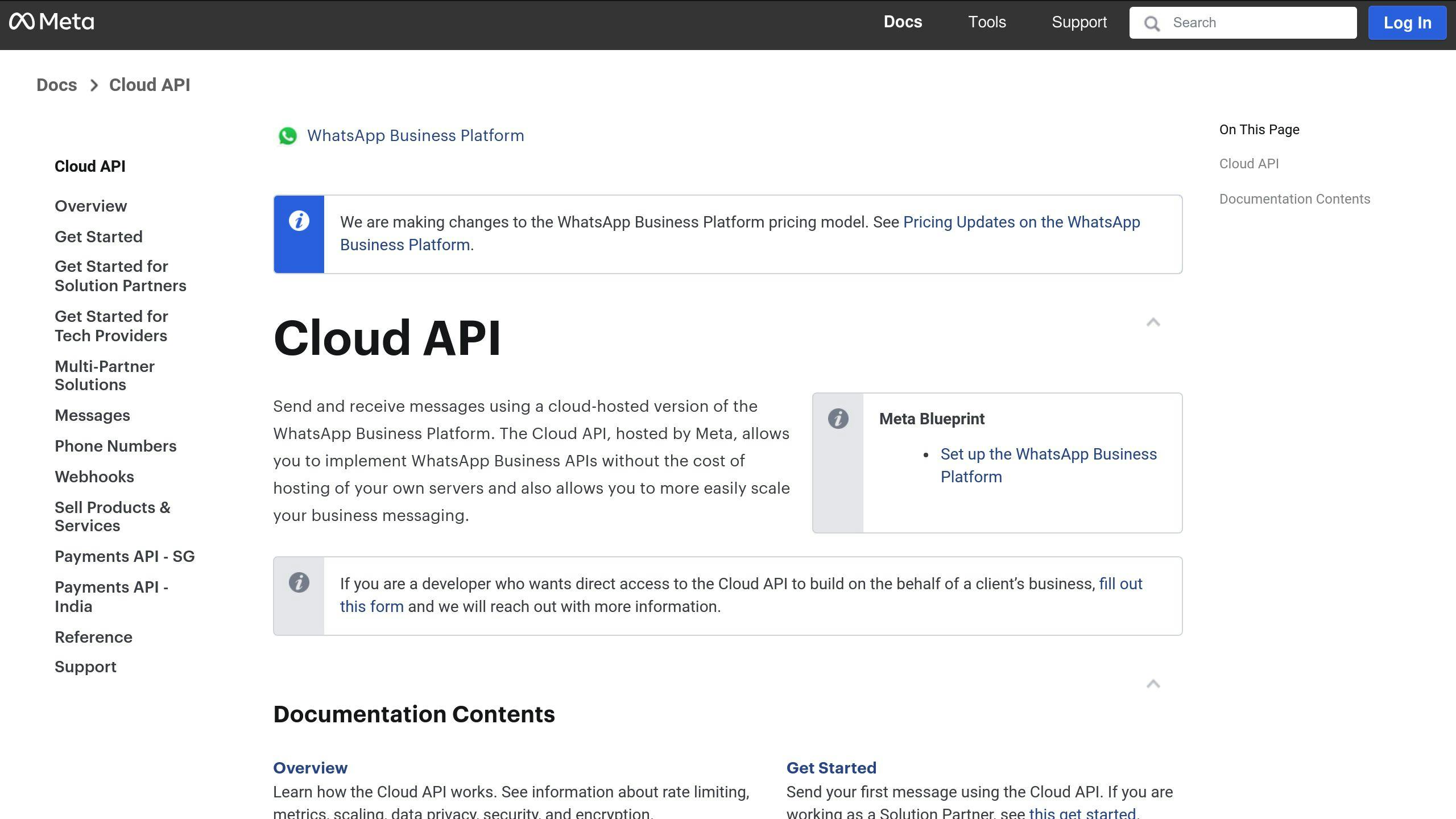How to Implement WhatsApp Business Cloud API: Best Practices for Education and Retail Support
Learn how to effectively set up and utilize the WhatsApp Business Cloud API to enhance communication in education and retail sectors.

The WhatsApp Business Cloud API is a tool for businesses to communicate directly with customers on WhatsApp. It’s hosted on Meta’s servers, so you don’t need to manage your own. Here’s why it’s useful and how to set it up:
Why Use It?
- For Education: Share exam updates, homework, and answer student questions instantly.
- For Retail: Send order updates, stock notifications, and handle customer support.
Key Features:
- Secure Messaging: GDPR-compliant and private.
- Automation: Use chatbots and quick replies for FAQs.
- Mass Messaging: Reach thousands of users (within WhatsApp’s guidelines).
- Integrations: Works with tools like Salesforce, HubSpot, and Shopify.
How to Set Up:
- Create a Meta Developer Account.
- Add WhatsApp to your app and agree to terms.
- Get a Phone Number ID and Access Token from Meta.
- Connect with CRM tools like Salesforce or Zendesk.
By combining automation, CRM integrations, and personalized messaging, businesses can improve communication and customer satisfaction. Whether it’s helping students with admissions or notifying customers about sales, the API streamlines operations effectively.
Related video from YouTube
How to Set Up WhatsApp Business Cloud API

Want to get started with the WhatsApp Business Cloud API? Here's what you need to know to set it up right.
Requirements for Setup
You'll need two main things before you start: a Meta Developer Account (get it at Meta for Developers) and a fresh phone number that's never been used with WhatsApp. While not required, we recommend getting your business profile verified - it helps build trust with your customers.
Step-by-Step Setup Instructions
Let's break down the setup process into clear, manageable steps:
Start with Meta Head to Meta for Developers and sign in with your Facebook account. Create a new app, pick "Business" as your app type, and fill in your app name and email.
Add WhatsApp to Your Setup Look for the WhatsApp section and hit "Set Up". You'll need to agree to the WhatsApp Business Platform API terms - standard stuff, but worth reading.
Set Up Your WhatsApp Connection Meta will give you two important pieces of info: your Phone Number ID and WhatsApp Business Account ID. They'll also provide a test number - use it to send a message and enter the code you get back to confirm everything's working.
Get Your Access Token Create a system user in the Meta dashboard with 'Admin' rights. Generate an access token that includes WhatsApp messaging permissions. Keep this token safe - you'll need it for connecting your systems.
Connect Your Business Tools Make your life easier by linking WhatsApp to tools like:
- Salesforce
- HubSpot
- Zendesk
Troubleshooting Setup Issues
Running into problems? Here's how to fix common issues:
Can't Connect? Double-check that your phone number isn't already linked to WhatsApp. If you're stuck, try starting the verification process fresh.
Message Limits New accounts can usually send 1,000 messages per day. Want to send more? Focus on quality conversations and get your business verified.
Business Verification Use Meta Business Manager to verify your business. This lets you show your business name in messages and bump up your message limits.
sbb-itb-3424a64
Best Practices for Using WhatsApp Business Cloud API
Automating Responses for Better Efficiency
Want to handle customer messages faster and smarter? Automation is your friend. It helps you respond quickly to customers, even during your busiest hours.
Think of automation as your 24/7 customer service assistant. It handles the simple stuff - like telling people your store hours or answering common questions. Plus, you can use WhatsApp-approved templates to send updates about orders or remind people about appointments.
Here's a real-world example: Zara uses automation to tell customers where their packages are, while university admissions offices use chatbots to help future students with their applications.
But here's the thing: automation is just the start. When you connect WhatsApp with your CRM tools, you can do even more for your customers.
Using Personalized Messages
Nobody likes getting generic messages. That's why smart businesses use customer data to create messages that feel personal and relevant. Let's look at how different industries make this work:
For Schools and Universities: Online learning platforms like Coursera send course suggestions based on what students have already learned. For example:
"Hi Alex, based on your interest in Data Science, we recommend our new Advanced Machine Learning course starting next month!"
For Retail Stores: Companies like Sephora use shopping history to suggest products their customers might love. Here's how they do it:
"Hi Sarah, complete your look with our new range of blushes that perfectly complement your foundation shade!"
Studies show this kind of personal touch can boost repeat purchases by up to 20%.
Integrating with CRM Tools
When you connect WhatsApp Business Cloud API with systems like Salesforce or HubSpot, you're not just adding another communication channel - you're creating a smarter way to talk to customers.
Keep Everything in One Place: Think of it like having all your customer conversations, orders, and preferences in a single folder. H&M uses this approach to track what their customers buy and ask about, making every interaction count.
Help Teams Work Better: When your sales and support teams can see the same customer information, magic happens. A customer asks about a product on WhatsApp, and your sales team knows exactly how to follow up.
Fix Problems Faster: Online learning platforms like Udemy use this setup to keep an eye on how students are doing. When someone needs help, the support team already knows their course history and can solve problems more quickly.
Using WhatsApp Business Cloud API for Education and Retail
The WhatsApp Business Cloud API helps education and retail businesses connect better with their audiences. Here's how businesses use this tool to boost communication and get better results.
Examples for the Education Sector
Exam Reminders and Support Schools now send automated messages about upcoming exams and deadlines. They include study tips and resource links to help students prepare better.
Study Materials at Your Fingertips Take Coursera's approach - they send course materials through WhatsApp, making it easy for students to access PDFs, videos, and assignments. This works great even with spotty internet. Their numbers tell the story: they saw 25% more student engagement in 2022 compared to email-based sharing.
Quick Answers When You Need Them Schools use chatbots to handle common questions about things like admissions and fees. Instead of waiting hours for answers, students get responses in seconds - making them 30% happier with the service.
Examples for the Retail Sector
Smart Product Info Big names like Decathlon and IKEA use WhatsApp to help shoppers learn about products and browse catalogs. By connecting their inventory systems, they show what's in stock right now. The results? 20% more sales and 40% better click rates than email marketing.
Personal Deals That Matter Stores look at what you've bought before to send deals you'll actually want. This smart approach leads to 25% more repeat purchases and builds stronger customer relationships.
Improving Support with Polser

Talk in Any Language With Polser's translation feature, language barriers disappear. One e-learning platform uses it to help students in over 10 languages, making sure everyone gets the support they need.
Quick, Smart Responses Polser's Smart Sidebar reads conversations and suggests perfect responses. When someone asks about returns or needs product advice, store staff can answer right away.
Easy Scheduling Polser makes booking appointments simple through WhatsApp chats. Tutoring centers use this feature to let parents book sessions, with automatic reminders to keep everyone on track.
Summary and Final Thoughts
Key Benefits of the API
The WhatsApp Business Cloud API packs a punch for both education and retail. Need to handle tons of messages? No problem. Schools can field thousands of admission questions at once, while shops can keep up with Black Friday madness - all without breaking a sweat. Plus, there's a sweet deal: 1,000 free chats each month, perfect for small businesses looking to step up their customer service game.
What makes this API really shine? It's how it mixes personal touch with automation. Hook it up to your CRM, and you're sending messages that feel personal while keeping response times lightning-fast. Picture this: a retail store automatically sending you product suggestions based on what you've bought before - pretty neat, right?
When it comes to keeping sensitive info safe - like student records or payment details - the API doesn't mess around. That's why both schools and shops trust it for their most private conversations and transactions.
Recommendations for Businesses
Want to get the most out of WhatsApp Business Cloud API? Here's what works:
Mix and match with other tools: Plug in third-party solutions to boost your response game. It's like giving your customer service team superpowers - they'll handle questions faster and better than ever.
Smart automation with a human touch: Let robots handle the basic stuff while keeping messages personal. Think about an online school that sends automatic course info but tailors recommendations to each student's interests. The numbers back this up too - Meta's data shows that when you personalize your messages, you get 25% more repeat purchases.
Connect your CRM: This is your secret weapon for smooth customer service. By linking everything together, you'll know exactly who you're talking to and what they need, every single time. It's like having a perfect memory of every customer interaction.
